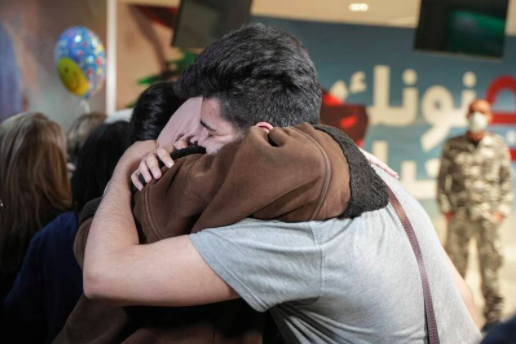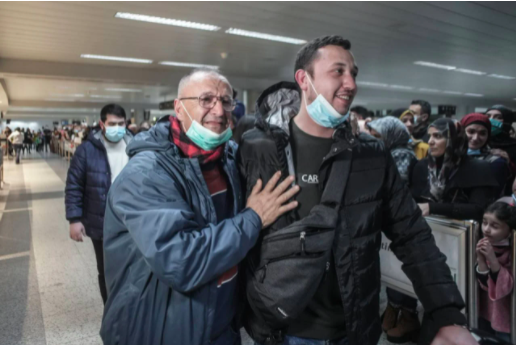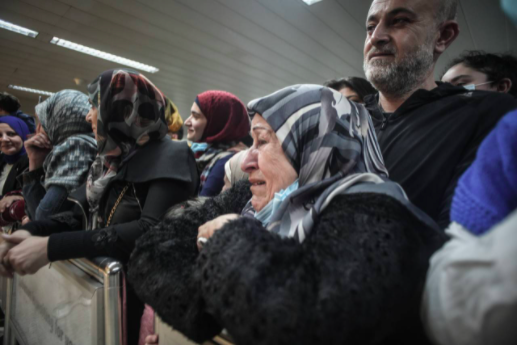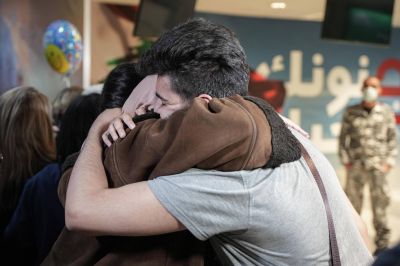
Sundaym March 6, at Beirut airport: Chadia el-Hassan hugs her two children Amira and Ahmad who have gone through an ordeal to cross the border between Ukraine and Poland from where they were repatriated to Lebanon. (Credit: Mohammad Yassine)
Saadallah flips his lid. His anger is unleashed as he waits for his daughter Yara, 19, aboard a delayed repatriation flight from Warsaw to Beirut.
Yara, along with more than 100 Lebanese citizens on board, had to find refuge in Poland following Russia's invasion of Ukraine, where they resided.
Saadallah’s anger is directed at the Lebanese political ruling class, which he blames for all evil, including the decision made by so many parents to have their children go abroad to study.
“Stop it before we get kicked out,” says his wife Mirvat, who could not hide with her makeup the dark circles under her eyes that underscored the anguish she had felt during the past few days.
“See if I care,” he loudly replies in the arrivals hall of Beirut International Airport. “They’re all thieves,” he adds.
If this father, in his 60s, made these searing comments, it is because his relief at finally reuniting with his daughter is mixed with his deep concern at the idea of his daughter returning to Lebanon.
“Our children’s future was destroyed here [in Lebanon],” says the pediatrician who hails from Akkar, and whose children Fadi and Yara have been enrolled in universities in Ukraine, where tuition fees are much lower than in Lebanon.
However, amid an economic meltdown that sank Lebanon into a severe crisis, a devaluation of the local currency and successive banking restrictions, it has become prohibitively expensive for him to send his children abroad for studies.
“I had to beg for money,” he said. His monthly income is hardly higher than LL3 million,the equivalent of $145 at the current rate of LL20,600 to the greenback, while his medical examinations and their associated costs have multiplied. “What to do now to have them pursue their education? I have nothing left!”
This Sunday evening, he went to the airport with the Chehraoui family, whose three sons study in Ukraine. “I told them not to take the same vehicle on the escape route, just in case it was shelled,” their mother Fadia said.
“This is not a country”
In the hall, the parents wear a gloomy look. Signs of fatigue after several sleepless nights and concern for the children’s future can be seen plainly on their faces.
A strapping lad shouts out. “Rejoice! Now that your children are back!”
 At Beirut International Airport, the first repatriation of Lebanese from Ukraine who took refuge in Poland took place on Sunday 6 March. (Credit: Mohammad Yassine)
At Beirut International Airport, the first repatriation of Lebanese from Ukraine who took refuge in Poland took place on Sunday 6 March. (Credit: Mohammad Yassine)
Mohammad, who awaits his two children and his wife, stands next to him. They moved to Kyiv a few months ago, because his son, Abbas, joined the Dynamo Kyiv football team. It did not take him too long before his dreams turned into a waking nightmare.
“They spent eight days under the bombs.” Despite that, his family told him by phone a few hours before boarding that they feel sad because they have to return. “This is not a country,” he lamented.
It is already 8:30 p.m. and the parents have been counting the minutes for more than an hour. The flight was scheduled to land at 7:30 p.m. “We will have to wait for another hour before they arrive,” Wassim, who came from Minieh, said as he paced back and forth in the hallway.
His wife, Wissam, was on a seat waiting to greet her son, Wissaf, with a bouquet of flowers. He was studying in Kharkiv for three years. Ukraine’s eastern and second biggest city of Kharkiv has come under heavy Russian fire for several days.
Wissam has the entire family around her. “We couldn't afford to fill our gas tank. It was my brother-in-law who gave us the ride,” she lamented, as queues at gas stations returned over the weekend in Lebanon as fears of another wave of fuel shortages spread.
“It sounded like a funeral at her place,” said Samia, Wissam’s sister-in-law. Her son had to spend four days in a bomb shelter. Then, he managed to cross into Poland in the bitter cold weather, and slept in a train station when possible.
“He had no more money and nothing left to eat,” the mother recounted, and added that he was only able to pack a few small items and his laptop.
In order to settle his tuition fees, his father had to sell a shop, two cars, and “will have to sell a plot of land soon,” he said.
Today, he hopes that the war in Ukraine will end soon, so that his son can return to study there. “I have concerns that he would have to start over. He left everything there; his life and his future,” his mother said with a weary voice.
Recognizing them just by their backpack
It is 9:17 p.m. The flight ultimately lands safely. The families start heading toward the barrier to greet their loved ones. Some pull out their phones, and start making video calls to share this moment with those who could not be at the airport. The passengers walk by. But those who were supposed to be repatriated still did not show up.
Maj. Gen. Mohammed Kheir, the secretary-general of the High Relief Committee, which handled the repatriation of the Lebanese trapped in Ukraine, is the first to arrive in the hall. He explained that 105 students were aboard the flight.
Once the first youngsters arrived, the hall resounded with applause coupled with ululations. The cameras focused on them. They become the stars of the evening. Some allowed themselves to give interviews. Others contented themselves with a simple “hamdoulilah” before exiting the airport.
These Lebanese coming from Ukraine can be easily identified by their small carry-on luggage or backpacks, evidence of their rushed return.
“Ya mama, ya mama,” Chadia el-Hassan cried out as she pressed her two children, Amira and Ahmad, against her chest for very long minutes, while they were still on the other side of the barrier. Tears streamed down Amira’s cheeks.
 The relief of finding the Lebanese from Ukraine was mixed with concern, Sunday March 6 at Beirut Airport. Concern about the future in the country of the Cedars. (Credit: Mohammad Yassine)
The relief of finding the Lebanese from Ukraine was mixed with concern, Sunday March 6 at Beirut Airport. Concern about the future in the country of the Cedars. (Credit: Mohammad Yassine)
Ahmad pulls himself out of his mother’s arms and heads toward his little brother. “We are almost the same height,” he told him.
Ralph jumps on the seating behind them, he is excited to see his sister Ghada coming from Kharkiv where she had settled six months ago. “Everyone was very stressed at home and I had to keep my cool.” His sister showed up, and now he could finally burst into tears.
"At least we still had WIFI"
Mothers wrap their arms around their children as they tell them “Ya habibi, ya oumri, ya albeh, ya ouyouneh” (synonymous for ‘my dearest’).
Within this cacophony of emotion, there is a different experience: Oxana, who hails from Ukraine, gently caresses the curly hair of her daughter Rima, who was studying in Kyiv. “You are alive,” she quietly reiterated, as Rima burst into tears in her arms.
She paused for a second, and spoke in Ukrainian. Her daughter smiles. “Fuck Russia…,” Oxana translated her sentence.
Rima is still in a state of shock. “We have seen it all, we have heard it all … Everything is in ruin.” Her voice breaks. That's everything she’s been able to tell. This Lebanese-Ukrainian does not grasp how some Lebanese could be in favor of Putin. “I hope their children go through the same condition as us.”
A few meters away, there is Yara, Mirvat’s daughter, who just arrives and tries to make her mom crack up. “It is true there was war there, but at least we still had WIFI!” she told her. Mirvat finally chuckles.
Her son, Fadi, did not want to return and went to Germany instead. “At least there, he will lead a respectful life,” Mirvat said, before she turned around and walked away.
This article was originally published in French in L'Orient-Le Jour. Translation by Joelle El Khoury.
